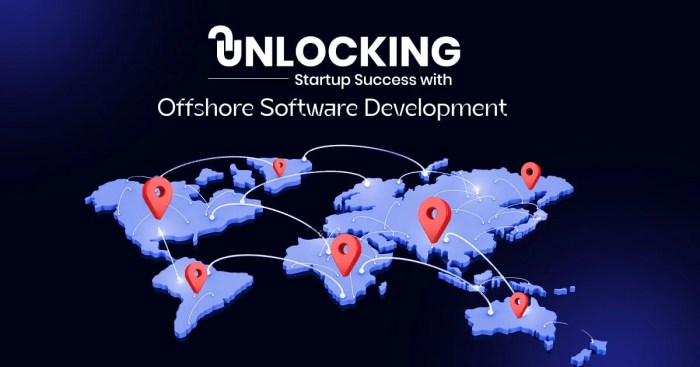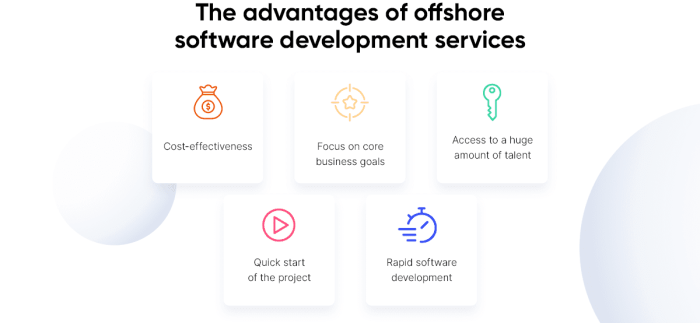In today’s globally interconnected world, businesses are increasingly leveraging the benefits of offshore software development services. This strategic approach offers a multitude of advantages, from cost savings and access to specialized talent to accelerated project timelines and enhanced scalability. This comprehensive guide delves into the intricacies of offshore software development, providing a detailed understanding for businesses considering this option.
Understanding Offshore Software Development
Offshore software development involves outsourcing the development of software applications or software components to a company or team located in a different country. This contrasts with nearshore development (outsourcing to a geographically closer country) and onshore development (using a local team). The primary driver for many companies choosing this model is cost-effectiveness, as development costs in certain regions are significantly lower than in others.
Key Benefits of Offshore Software Development
- Cost Reduction: Lower labor costs in many offshore locations significantly reduce development expenses.
- Access to Specialized Talent: Tap into a global pool of skilled developers with expertise in specific technologies and domains.
- Faster Time-to-Market: Leverage larger development teams and flexible working hours to accelerate project timelines.
- Increased Scalability: Easily scale your development team up or down based on project needs without the overhead of hiring and managing in-house employees.
- 24/7 Development Cycle: Overlapping time zones allow for continuous development and faster turnaround times.
- Focus on Core Business: Free up internal resources to concentrate on core business functions and strategic initiatives.
Potential Challenges of Offshore Software Development
While the benefits are compelling, it’s crucial to acknowledge potential challenges:

Source: googleusercontent.com
Offshore software development services often handle sensitive client data, making robust security paramount. This necessitates careful consideration of data protection measures, including the use of strong encryption. Choosing the right tools is crucial; for example, researching options like those listed in this guide to best hard disk encryption software can significantly enhance data security for your offshore development team.
Ultimately, a secure development process contributes to the overall success of offshore projects.
- Communication Barriers: Language differences and cultural nuances can impact communication and collaboration.
- Time Zone Differences: Scheduling meetings and coordinating work across different time zones can be complex.
- Quality Control: Ensuring consistent quality and adherence to standards requires robust project management and quality assurance processes.
- Security Concerns: Protecting intellectual property and sensitive data requires careful consideration of security protocols and contractual agreements.
- Legal and Regulatory Compliance: Navigating different legal and regulatory frameworks can be challenging.
Choosing the Right Offshore Software Development Partner
Selecting a reliable and competent offshore software development partner is critical to the success of your project. Consider these factors:
Factors to Consider When Selecting an Offshore Development Partner
- Experience and Expertise: Look for a partner with a proven track record in your specific industry and technology stack. Review their portfolio and client testimonials.
- Communication and Collaboration: Assess their communication skills and ability to work effectively across different time zones and cultures. Consider video conferencing capabilities and project management tools they utilize.
- Development Methodology: Determine their preferred development methodology (Agile, Waterfall, etc.) and ensure it aligns with your project requirements. Look for evidence of iterative development and responsiveness to change.
- Quality Assurance Processes: Inquire about their quality assurance procedures, testing methodologies, and code review processes to ensure high-quality deliverables.
- Security Measures: Understand their security protocols for protecting your intellectual property and sensitive data. Request information about their data security certifications and compliance standards (e.g., ISO 27001).
- Legal and Contractual Agreements: Thoroughly review the contract to ensure clear terms and conditions, intellectual property rights, and dispute resolution mechanisms.
- Pricing and Payment Terms: Understand their pricing model (fixed-price, time and materials, etc.) and payment terms to avoid unexpected costs.
- Client References: Request references from previous clients to assess their satisfaction and the partner’s performance.
Popular Offshore Software Development Locations
Several countries have emerged as popular destinations for offshore software development, each offering unique strengths and advantages:
Top Offshore Development Destinations, Offshore software development service
- India: Known for its large pool of skilled developers and competitive pricing.
- China: A significant player in software development, offering a wide range of expertise and cost-effectiveness.
- Eastern Europe (Ukraine, Poland, Romania): Strong technical skills, relatively close time zones to Western Europe, and competitive pricing.
- Latin America (Mexico, Brazil, Argentina): Growing talent pool, proximity to the US, and cost advantages.
- Philippines: Known for English proficiency and a strong focus on customer service.
Technologies Used in Offshore Software Development
Offshore development teams often work with a broad range of technologies, including:
Common Technologies in Offshore Development
- Java: A widely used programming language for enterprise applications.
- .NET: Microsoft’s framework for building web and desktop applications.
- Python: A versatile language used for web development, data science, and machine learning.
- PHP: A popular server-side scripting language for web development.
- JavaScript: Essential for front-end web development and increasingly used for back-end development.
- React, Angular, Vue.js: Popular JavaScript frameworks for building user interfaces.
- Cloud Computing (AWS, Azure, GCP): Increasingly used for deploying and managing software applications.
- Mobile Development (iOS, Android): Building applications for mobile platforms.
Frequently Asked Questions (FAQ): Offshore Software Development Service
- Q: Is offshore software development safe for my intellectual property? A: Yes, provided you choose a reputable partner with robust security measures and include strong intellectual property protection clauses in your contract. Due diligence is crucial.
- Q: How can I ensure the quality of the software developed offshore? A: Implement rigorous quality assurance processes, including code reviews, testing, and regular communication with your development team. Choose a partner with a proven track record of delivering high-quality software.
- Q: What are the common communication challenges in offshore software development? A: Language barriers, time zone differences, and cultural nuances can all impact communication. Proactive measures such as clear communication protocols, regular meetings, and the use of project management tools can mitigate these challenges.
- Q: How do I manage an offshore development team effectively? A: Establish clear communication channels, use project management software, define roles and responsibilities, and set realistic expectations. Regular progress updates and feedback are crucial for effective management.
- Q: What are the different pricing models for offshore software development? A: Common models include fixed-price contracts (suitable for well-defined projects), time and materials (for flexible projects), and dedicated teams (for ongoing development needs).
Conclusion
Offshore software development offers a compelling solution for businesses seeking to reduce costs, access specialized talent, and accelerate project timelines. By carefully selecting a reputable partner and implementing robust project management practices, businesses can successfully leverage the benefits of offshore development while mitigating potential risks. Remember to prioritize clear communication, strong quality assurance, and robust security measures to ensure a successful outcome.
Ready to explore the possibilities of offshore software development for your business? Contact us today for a consultation!

Source: excellentwebworld.com
Helpful Answers
What are the common risks associated with offshore software development?
Common risks include communication barriers, time zone differences, cultural misunderstandings, intellectual property concerns, and potential quality control issues. Mitigation strategies involve thorough due diligence, clear contracts, regular communication, and robust quality assurance processes.
How do I choose a reputable offshore software development provider?
Look for providers with a strong track record, positive client testimonials, a clear understanding of your project requirements, and a robust development process. Verify their technical expertise, check their security measures, and ensure they have a proven history of successful project delivery.

Source: rewisoft.com
What are the typical payment models for offshore software development?
Common payment models include fixed-price contracts, time and materials billing, and dedicated team models. The best model depends on the project’s scope, complexity, and the level of flexibility required.
How can I manage communication effectively with an offshore team?
Establish clear communication channels (e.g., project management software, video conferencing), define communication protocols, and schedule regular meetings to ensure transparency and address issues promptly. Consider time zone differences when scheduling these interactions.
